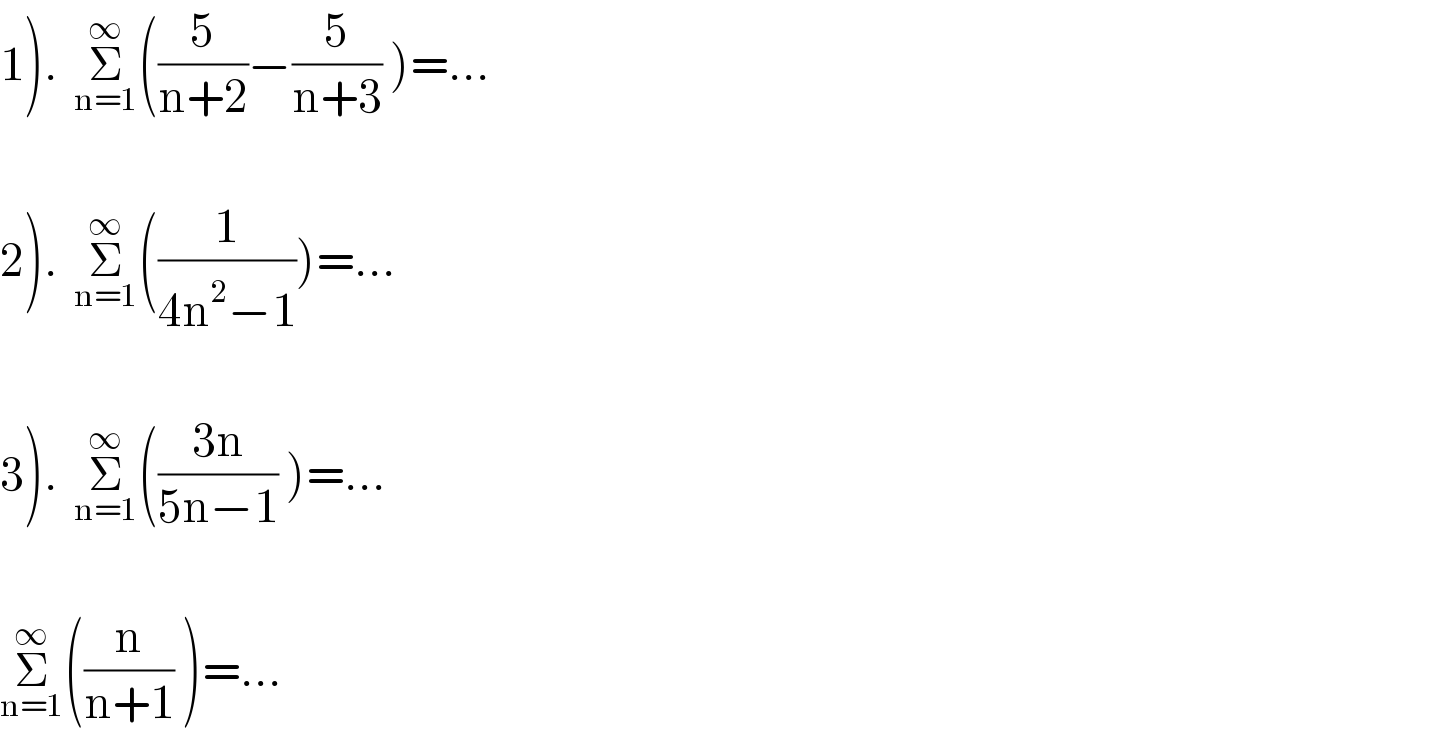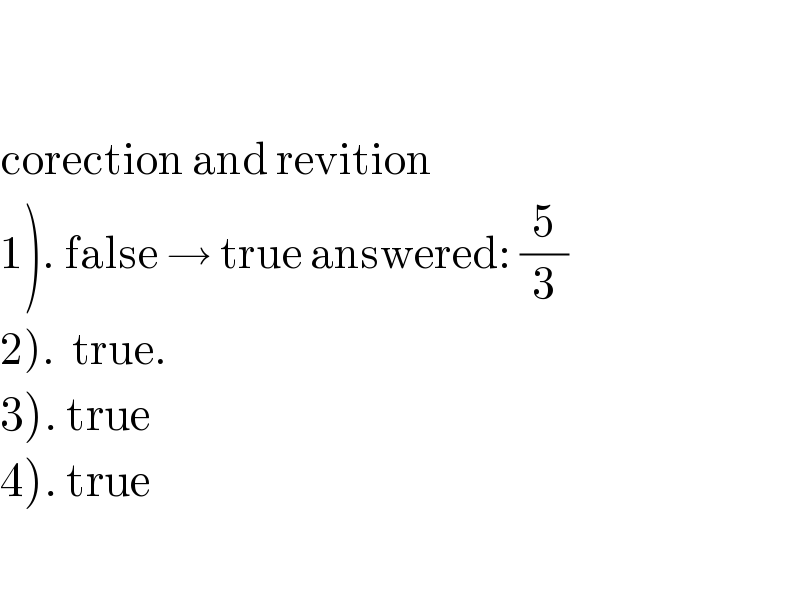
Question Number 91837 by zainal tanjung last updated on 03/May/20

$$\left.\mathrm{1}\right).\:\:\underset{\mathrm{n}=\mathrm{1}} {\overset{\infty} {\sum}}\left(\frac{\mathrm{5}}{\mathrm{n}+\mathrm{2}}−\frac{\mathrm{5}}{\mathrm{n}+\mathrm{3}}\:\right)=... \\ $$$$ \\ $$$$\left.\mathrm{2}\right).\:\:\underset{\mathrm{n}=\mathrm{1}} {\overset{\infty} {\sum}}\left(\frac{\mathrm{1}}{\mathrm{4n}^{\mathrm{2}} −\mathrm{1}}\right)=... \\ $$$$ \\ $$$$\left.\mathrm{3}\right).\:\:\underset{\mathrm{n}=\mathrm{1}} {\overset{\infty} {\sum}}\left(\frac{\mathrm{3n}}{\mathrm{5n}−\mathrm{1}}\:\right)=... \\ $$$$ \\ $$$$\underset{\mathrm{n}=\mathrm{1}} {\overset{\infty} {\sum}}\left(\frac{\mathrm{n}}{\mathrm{n}+\mathrm{1}}\:\right)=... \\ $$
Commented by Tony Lin last updated on 03/May/20

$$\left.\mathrm{1}\right)=\mathrm{5}\left(\frac{\mathrm{1}}{\mathrm{3}}−\underset{{n}\rightarrow\infty} {\mathrm{lim}}\frac{\mathrm{1}}{{n}}\right)=\frac{\mathrm{5}}{\mathrm{3}} \\ $$$$\left.\mathrm{2}\right)=\frac{\mathrm{1}}{\mathrm{2}}\underset{{n}=\mathrm{1}} {\overset{\infty} {\sum}}\left(\frac{\mathrm{1}}{\mathrm{2}{n}−\mathrm{1}}−\frac{\mathrm{1}}{\mathrm{2}{n}+\mathrm{1}}\right) \\ $$$$=\frac{\mathrm{1}}{\mathrm{2}}\left(\mathrm{1}−\underset{{n}\rightarrow\infty} {\mathrm{lim}}\frac{\mathrm{1}}{\mathrm{2}{n}+\mathrm{1}}\right)=\frac{\mathrm{1}}{\mathrm{2}} \\ $$$$\left.\mathrm{3}\right)\underset{{n}\rightarrow\infty} {\mathrm{lim}}\frac{\mathrm{3}{n}}{\mathrm{5}{n}−\mathrm{1}}=\frac{\mathrm{3}}{\mathrm{5}}\neq\mathrm{0}\rightarrow{divergent} \\ $$$$\left.\mathrm{4}\right)\underset{{n}\rightarrow\infty} {\mathrm{lim}}\frac{{n}}{{n}+\mathrm{1}}=\mathrm{1}\neq\mathrm{0}\rightarrow{divergent} \\ $$
Commented by zainal tanjung last updated on 03/May/20

$$ \\ $$$$ \\ $$$$\mathrm{corection}\:\mathrm{and}\:\mathrm{revition} \\ $$$$\left.\mathrm{1}\right).\:\mathrm{false}\:\rightarrow\:\mathrm{true}\:\mathrm{answered}:\:\frac{\mathrm{5}}{\mathrm{3}} \\ $$$$\left.\mathrm{2}\right).\:\:\mathrm{true}. \\ $$$$\left.\mathrm{3}\right).\:\mathrm{true} \\ $$$$\left.\mathrm{4}\right).\:\mathrm{true} \\ $$$$ \\ $$
Commented by Tony Lin last updated on 03/May/20

$${I}\:{have}\:{corrected} \\ $$
Commented by zainal tanjung last updated on 03/May/20

$$\mathrm{okey}.\:\mathrm{thanks} \\ $$
Commented by john santu last updated on 03/May/20
You seem like you're testing
